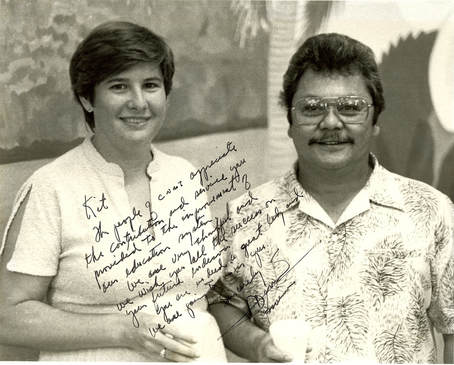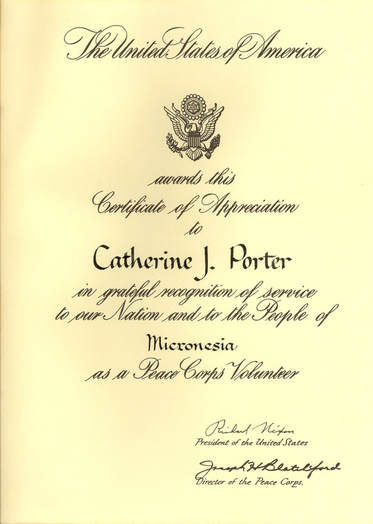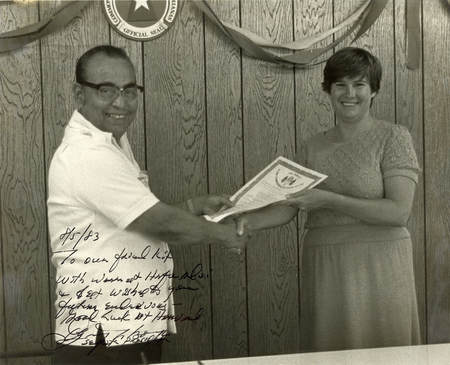More About Kit
I am in my seventies making decisions about how to use my time and have settled on three focuses. One is this project—to have the materials I purchased, collected and saved over my lifetime go to the NMI in a modern and durable form. I grew up in a Navy family--my father was a Navy pilot who survived the attack on Pearl Harbor. We moved often and I tend to adapt to where I am living without looking back. Although I have not been in frequent contact with people in the NMI, they are always in my heart and remembered fondly.
When I left NMI after the Peace Corps in 1969, I got a Masters Degree in TESL, taught elementary and secondary school, raised my daughter and sort of farmed doing subsistence living as some of my generation did in the 70s. In 1975 I was invited back to the NMI to set up the Title VII Chamorro Bilingual/bicultural program. I then wrote the proposal for the Title VII Carolinian bilingual/bicultural program. And initiated that program. The NMI had become a US Commonwealth and those of us working in the NMI Department of Education did everything we could to write and get funded competitive grants to support quality education.
With local people heading the bilingual/bicultural programs, I was asked to coordinate teacher training, to serve as director of higher education for the NMI and to set up a college. My goal was to make higher education at all levels available within the islands. In all I lived on Saipan eight years. My daughter went to school there grades one through eight. At the end of my fourth contract, it was time to leave for personal reasons. The college was a candidate for accreditation and a local person was ready to be in charge. Saipan was the longest I had ever lived in one place. Since then I have received a master and doctorate from Harvard Graduate School of Education, and have had many teaching and contract jobs.
My second focus has been researching and teaching dispute resolution and effective teaching methods. Currently, I teach dispute resolution for the Northeast Fisheries Observer Program. I have also worked with the Alaska Marine Safety Education Association. While at the World Maritime University in Sweden, I studied cultural communication issues at sea leading to incidents visiting maritime institutions worldwide to document how they taught language (verbal and nonverbal) and culture.
My third focus is family, friends and home.
When I left NMI after the Peace Corps in 1969, I got a Masters Degree in TESL, taught elementary and secondary school, raised my daughter and sort of farmed doing subsistence living as some of my generation did in the 70s. In 1975 I was invited back to the NMI to set up the Title VII Chamorro Bilingual/bicultural program. I then wrote the proposal for the Title VII Carolinian bilingual/bicultural program. And initiated that program. The NMI had become a US Commonwealth and those of us working in the NMI Department of Education did everything we could to write and get funded competitive grants to support quality education.
With local people heading the bilingual/bicultural programs, I was asked to coordinate teacher training, to serve as director of higher education for the NMI and to set up a college. My goal was to make higher education at all levels available within the islands. In all I lived on Saipan eight years. My daughter went to school there grades one through eight. At the end of my fourth contract, it was time to leave for personal reasons. The college was a candidate for accreditation and a local person was ready to be in charge. Saipan was the longest I had ever lived in one place. Since then I have received a master and doctorate from Harvard Graduate School of Education, and have had many teaching and contract jobs.
My second focus has been researching and teaching dispute resolution and effective teaching methods. Currently, I teach dispute resolution for the Northeast Fisheries Observer Program. I have also worked with the Alaska Marine Safety Education Association. While at the World Maritime University in Sweden, I studied cultural communication issues at sea leading to incidents visiting maritime institutions worldwide to document how they taught language (verbal and nonverbal) and culture.
My third focus is family, friends and home.



